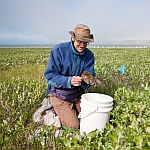 |
Donald Reid
Emeritus Scientist
Don Reid retired from active duty with WCS Canada in May 2023, but remains affiliated as an adviser and while he publishes various scientific and policy investigations. Don led the Northern Boreal Mountains landscape program in northwest Canada (based out of Whitehorse, Yukon) from WCS Canada’s inception in 2004. With MSc (University of Calgary) and PhD (University of British Columbia) degrees, he spent about half his working life as a wildlife biologist with WCS, first as a contractor with WCS Global on the giant panda conservation program in Sichuan, China (1985-88), and later with WCS Canada. In northwest Canada, Don led WCS Canada’s involvement in strategic land use planning and establishment of new protected areas (Peel Watershed and Dawson Region planning), research on the influence of climate change on Arctic terrestrial ecology (International Polar Year 2006-2010, and Arctic Biodiversity Assessment), policy debates on environmental impacts of energy (large-scale hydro, and biomass) developments, conservation of wildlife on agricultural lands, lake conservation, and planning for impacts of climate change on ecosystems. His WCS field research in boreal Yukon has focused on river otters as indicators of aquatic ecosystem health, beavers as agents of change in riparian ecosystems, and spatial scale of forest disturbance as an influence on food webs where snowshoe hares are the dominant trophic species. He is currently exploring the origins and philosophical/cultural basis of the colonial-materialist world view so as to better understand its dramatic and sinister inability to provide a sustainable future for humans and Nature, and search for remedies.
|
|
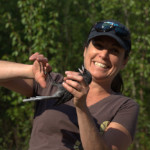 |
Hilary Cooke
Co-Director Northern Boreal Mountains Program
Hilary Cooke joined WCS Canada in 2010 as Associate Conservation Scientist for the Northern Boreal Mountains landscape of Yukon and northern British Columbia. Here she works with a range of partners, including First Nation, territorial, and federal governments, to enhance conservation of wildlife and wild places through regional planning, environmental assessments, and land, resource, and wildlife management.
Hilary specializes in boreal ecology, forest management, avian conservation, and conservation planning. Since 2010, she has led several field and applied studies aimed at improving conservation and management of Yukon’s valley bottoms for key ecosystems, migratory birds, and species of conservation concern. Through relevant government initiatives Hilary continues to promote science-based solutions to improve conservation for wildlife and wild places across Yukon’s boreal mountains.
Hilary began her career with WCS as a member of the North America Program in 1998, where she conducted field studies to inform riparian conservation on public and private lands in semi-arid regions of the western United States. After earning a MSc in Wildlife Management at Humboldt State University in 2002, Hilary returned to her native Canada in 2003 to complete a PhD in Ecology at the University of Alberta. Her PhD research aimed to improve forest management for woodpeckers and other cavity users of old boreal forest.
Hilary’s passion for birds and conservation can be found in her blogs published on Muddy Boots, Huffington Post, and Medium.
|
|
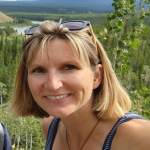 |
Chrystal Mantyka-Pringle
Co-Director Northern Boreal Mountains Program
Chrystal Mantyka-Pringle is the Co-Director of the Northern Boreal Mountains Program based in Whitehorse, Yukon and an Adjunct Professor at the University of Saskatchewan. She works closely with First Nation communities, governments, and other partners throughout Yukon to collaborate on meaningful research projects and land-use planning initiatives that reflect Indigenous and environmental values.
Chrystal specializes in understanding the impacts and interactions of climate and land-use change on biodiversity, and translating the implications into conservation planning. She holds a PhD from the University of Queensland’s Centre of Excellence for Environmental Decisions in Australia. She has worked for the Queensland State Government, Australian Government and the University of Saskatchewan on various research and environmental monitoring projects prior to moving to the Yukon in 2019.
|
|
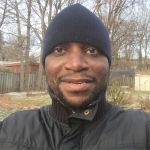 |
Tobi Oke
Post-doctoral fellow
Tobi Oke is a post-doctoral fellow with WCS Canada and the University of Saskatchewan, working on the Northern Boreal Climate Change Adaptation program. Tobi uses bioclimatic envelopes and vegetation models to evaluate species distributions, vulnerability, and projections for future distributions under climate change and natural disturbance. He also facilitates the development of web-based decision-support tools for interactive model parameterization and evaluation for northern ecosystems, in collaboration with the South Beringia Priority Place Initiative, Yukon First Nation Governments, Yukon Environment, Canadian Wildlife Service, Yukon Land Use Planning Council, and the Canadian Forest Service. Tobi completed his PhD in Integrative Biology at the University of Guelph, where he explored some of the mechanistic workings of northern peatlands, from plant traits to ecosystem dynamics including projections for future distribution of peatlands in North America. He recently completed a post-doctoral fellowship at the University of Texas Marine Science Institute, where he led a biodiversity synthesis project, using long-term fisheries independent surveys that he compiled for estuaries across the U.S coast, from the Gulf of Maine to the Gulf of Mexico.
Google Scholar
|
|
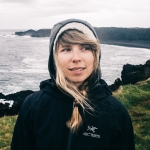 |
Alyssa Murdoch
Post-Doctoral Fellow
Alyssa is a Postdoctoral Fellow with WCS Canada’s Northern Boreal Mountains Program and Carleton University. She researches the effects of multiple stressors (climate change, land use change, overexploitation, water quality) on northern fishes to assist in evidence-based conservation solutions. Her Postdoctoral research focuses on building conservation capacity for declining Yukon River Chinook salmon, an important cultural food source for thousands of Yukon First Nations citizens and Alaskan Natives. She completed her PhD at York University in Toronto, where she studied how northern North American fishes are responding to rapid environmental change. Her PhD research was recognized for excellence in fisheries, earning her the Peter A. Larkin Award in 2020 (given to the top fisheries science student in Canada by the American Fisheries Society). Prior to that, she worked in research, environmental consulting, and fish habitat management, allowing her to visit some of Canada’s most remote and spectacular places – from Nunavik to the Mackenzie River Delta to Yukon.
Personal website: www.alyssamurdoch.ca/
Twitter: https://twitter.com/alyssa_murdoch
Google Scholar: https://scholar.google.ca/citations?user=TlOsoJQAAAAJ&hl=en
|
|
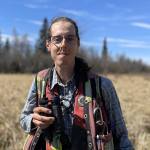 |
Chris Coxson
Avian Technician
Chris Coxson serves as Avian Technician at WCS. Chris is a Registered Biology Technologist and Professional Agrologist with extensive experience leading field work in British Columbia and Alberta. They completed a B.Sc. in Chemistry and Environmental Science in 2016 at the University of Northern British Columbia and have since worked as an environmental consultant focused on soils, water quality, and a variety of biological surveys.
Chris is a keen birdwatcher with more than a decade of volunteer experience assisting at banding stations, and completing a variety of point count surveys. In recent years they have focused their professional work toward birds, with projects including territory mapping, nest survival and productivity monitoring, boat-based waterfowl surveys, and automated recording unit studies.
|
|
 |
Christopher Addison
Indigenous-led Conservation Specialist
Chris received a B.Sc. in Biology from the University of British Columbia in 1996. After studying amphibian populations in Clayoquot Sound and Virginia determining the effectiveness of mitigations for forestry and acid rain, respectively, he began working with game species and species at risk including woodland caribou, which have been the focus of Chris' interest for more than 20 years. During that time, his knowledge of and passion for Indigenous culture, rights, and relationships with land and wildlife has continued to grow and evolve.
|
|
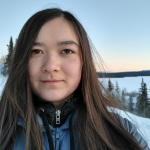 |
Clara Reid
Avian Field Intern
Clara Reid serves as Avian Field Intern at WCS. Clara attained a B Sc. from the University of Victoria in 2019, double majoring in Biology and Environmental Studies. This included conducting a study of arctic lupine floral longevity. She has since returned to Whitehorse, Yukon where she grew up. She has worked as a technician on palaeontology, forest ecology and forest management projects. However, her interest in regenerative agriculture has also led her to work on small farms in the Yukon and on the British Columbia south coast. Clara is excited to be joining WCS Canada in 2023 as an Avian Field Intern, and will be assisting with avian monitoring in central Yukon.
|
|
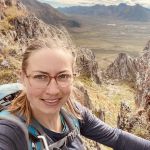 |
Morgan Brown
Breeding Bird Cumulative Effects Post-Doctoral Fellow
Morgan Brown serves as Breeding Bird Cumulative Effects Post-Doctoral Fellow at WCS. Morgan’s interest in avian research began during her BSc at the University of Western Ontario with an honours project studying stopover performance between aggressive and non-aggressive morphs of migrating white-throated sparrows. After working several fieldwork contracts for a mix of NGOs, government, environmental consulting firms and academic groups, she completed her MSc at Acadia University. There she studied regional-scale movement ecology of post-breeding and migratory blackpoll warblers, focusing on whether movement patterns of first-year fledglings birds differ from experienced adult individuals. This work presented some of the first regional-scale movement paths of passerines during the post-breeding and migratory periods, tracked using an automated radio-telemetry array.
|
|